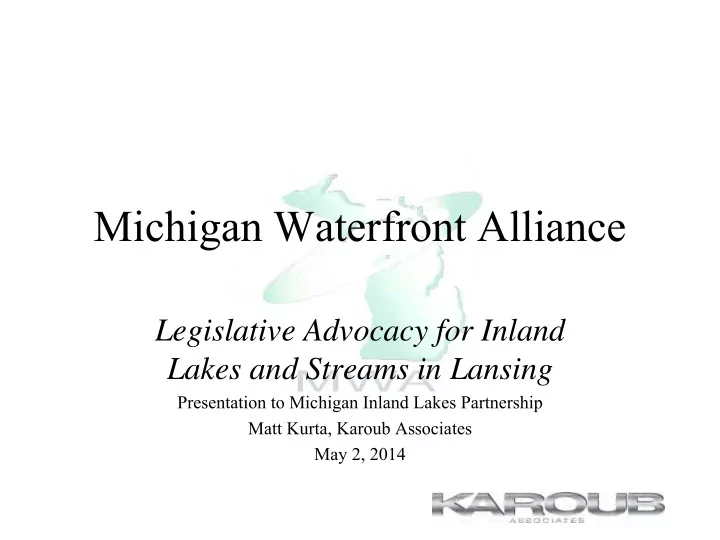

Michigan Waterfront Alliance Legislative Advocacy for Inland Lakes and Streams in Lansing Presentation to Michigan Inland Lakes Partnership Matt Kurta, Karoub Associates May 2, 2014
Who are we? • The Michigan Waterfront Alliance (MWA) is a nonprofit corporation formed to protect, preserve and promote the wise use of inland waters in Michigan • Membership currently includes 22 lake associations throughout Michigan • Karoub Associates is a “multi-client” lobbying firm, one of Lansing’s oldest and largest • Diverse client base, 9 full-time lobbyists • Karoub has represented MWA interests in Lansing since 2012
What is lobbying? • Merriam-Webster Definition: “'Lobbying' (also 'lobby') is a form of advocacy with the intention of influencing decisions made by the government by individuals or more usually by lobby groups; it includes all attempts to influence legislators and officials, whether by other legislators, constituents, or organized groups”
What do lobbyists do? • Everyone “lobbies”, almost everyone in this room has a “lobbyist”….even if you don’t know it • Institutional knowledge in the era of term limits • Direct advocacy, advice and counsel, association management, committee testimony preparation and development, access and much, much more • More on this later…
What we hope to cover today: • DNR Land Strategy and “Good Neighbor Policy” • Funding the Fight Against Invasives • AIS Legislative Initiatives • How to make a difference in Lansing • Feel free to ask questions at any time
DNR Land Strategy and “Good Neighbor Policy” • Public Act 240 of 2012 enacted a cap on DNR acquisition of surface rights on up to 4.626 million acres of land until May 1, 2015 – Beginning on May 1, 2015, cap shifts to prohibit DNR from acquiring surface rights on more than 3.91 million acres north of Mason-Arenac line – Acreage cap does not apply to a number of sub-categories: • Conservation easements • Land platted under the Land Division Act prior to July 2, 2012 • CFA land prior to July 2, 2012 • Land acquired via gift or litigation • If acquired on or after July 2, 2012: Land with an area of not more than 80 acres, or a right-of-way, used to access other DNR land • Trails
Land Strategy and DNR “Good Neighbor Policy” cont. • Requires DNR to develop a strategic plan for acquisition and disposal of land, with legislative intent to repeal land cap once a strategic plan is developed and approved by Legislature
Land Strategy and DNR “Good Neighbor Policy” – HB 5210 • House Bill 5210, sponsored by Rep. Wayne Schmidt (R-Traverse City), repeals the land cap and approves the new DNR strategic plan for acquiring and disposing of land • DNR Strategic Plan issued on July 1, 2013: – Divides state into regions – Identifies DNR-managed land in each region – Establishes measurable strategic performance goals with respect to availability of access points to water and land, outdoor recreation, forests, and wildlife and fisheries • “Good Neighbor Policy” - Improved coordination with other public lands to achieve mutual goals and multiple uses, but holds DNR accountable • Strategic plan cannot be approved without removal of land cap per 2012 statute – one cannot happen without the other
Funding the Fight Against Invasive Species
Fiscal Year 2014-2015 Budget • In February, Governor Snyder proposed $6 million to fight both terrestrial and aquatic invasive species. Of this amount: – $2 million is for one-time grants to cooperative weed management areas, $4 million ongoing to support 16 Full-time Employees (FTEs) dedicated to invasive species management within the DNR. – Governor’s budget proposes doubling the $2 million in one-time grants to $4 million in FY 2015-2016.
FY 2014-2015 Budget, cont. • $5.5 million included for Great Lakes Restoration Initiative. • Senate: – DNR Budget (Senate Bill 744) passed 34-4 this past Wednesday – Retains Governor’s recommendation for $4 million in ongoing funding for the 16 new FTEs – Retention of the proposed $2 million in grant funding. – Actually increases funding for this line-item by another $170,000
FY 2014-2015 Budget, cont. • House: – Budget is pending on House floor within the House “Omnibus” budget, House Bill 5313 – Appropriates $3 million in ongoing funding for 16 FTEs, a $1 million reduction from the Governor’s recommendation – Retains $2 million in one-time grant funding • Budget work should be completed by mid-June, with summer recess to follow
AIS Legislative Initiatives • SB 444 – Efficiencies and streamlining AIS permit process – Timeliness in treating and controlling AIS through creation of multi-year control permit/certificate of coverage • Language in previous draft of SB 444 shelved for time being: – Create a means by which a local government authority could enact ordinances to ensure that all public water surface users share in the cost of Aquatic Invasive Species control funding on the particular water body – Legislative pushback – Sen. Casperson has committed to working on this issue in the future
AIS Legislative Initiatives, cont. • SB 795-802 – Increased penalties for transport and/or release of invasive species, such as fines, license suspension and seizure of equipment • Recreation Passport Opt-Out
So, what can you do to make a difference? • Democracy is not a spectator sport - “The world is run by those who show up.” • Contact your state and federal legislators – Quality, not quantity – Another quote: “How to win friends & influence people” – a right way and a wrong way learned from experience • Attend public meetings held by governmental units • Join the Michigan Waterfront Alliance!
Thank you! Questions, compliments…complaints? Matt Kurta, Associate Bob Frye, President Karoub Associates Michigan Waterfront Alliance mkurta@karoub.com skibones@aol.com (517) 482-5000 (989) 821-6661 www.karoub.com www.mwai.org
Recommend
More recommend